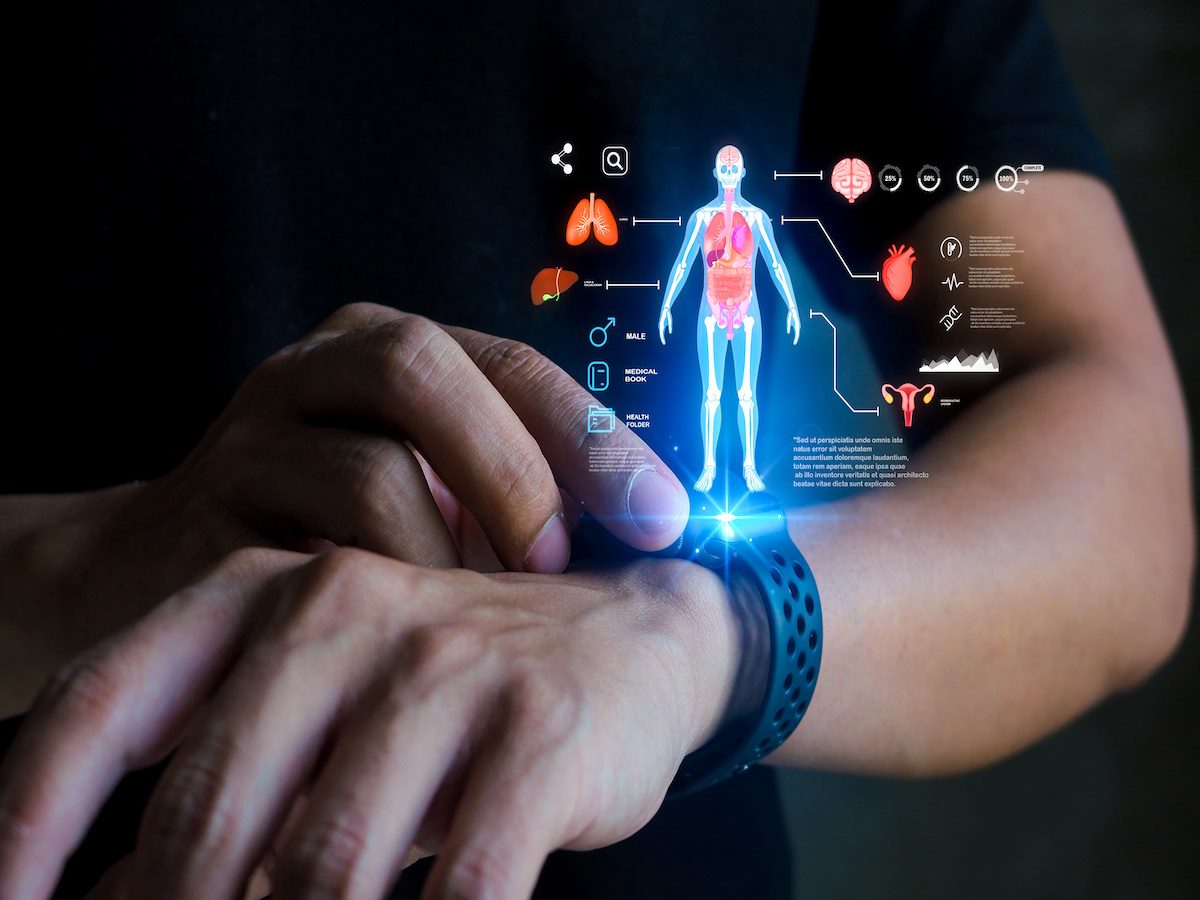Predictive healthcare? A system that acts before disaster strikes? Sounds absurd, right? Like science fiction. Not anymore. Burnout, soaring costs, inefficiency — deep learning says otherwise.
We call it "healthcare," but let's be honest: too much of it is just sick care. We wait for people to break, then try to fix them. We drown in data yet often fly blind when it comes to the real problems. We’re promised miracles, but costs keep soaring, and burnout is an epidemic. Is this the best we can do? Deep learning says no.
It’s not just a tech upgrade; it's a chance to rewrite the whole prescription.
Deep Learning Isn't Just Tech Jargon
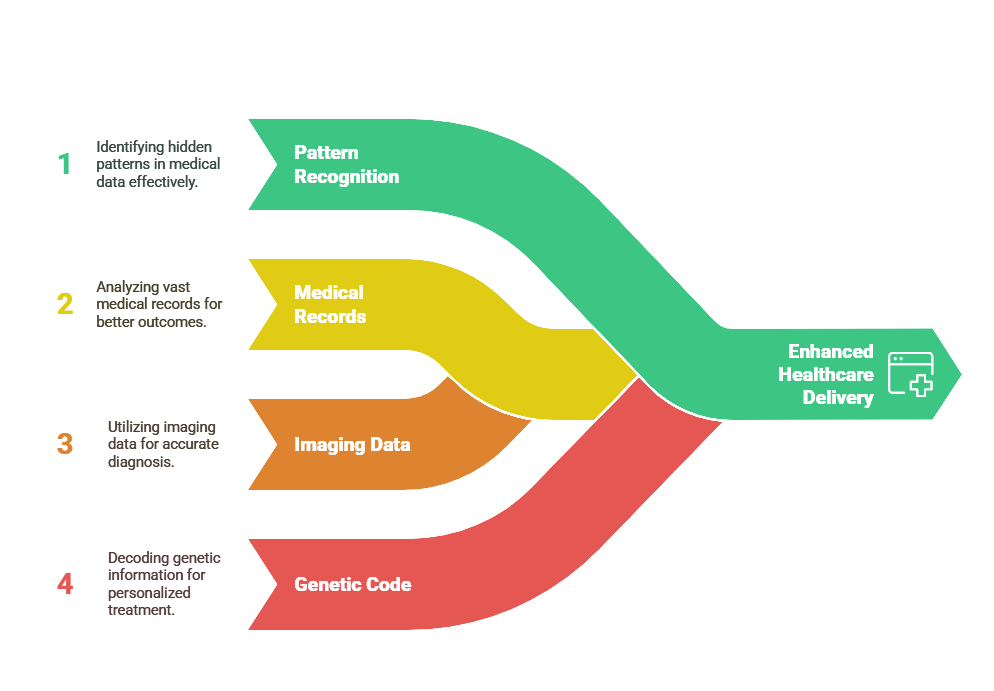
Forget the tech buzzwords. Deep learning is about intelligent machines learning to see patterns we humans can't — patterns hidden in mountains of medical records, images and genetic code.
Think of it like this: We've been using blunt instruments to solve healthcare's toughest puzzles for decades. Now, we have a scalpel — precise, powerful and capable of insights we never dreamed of. This isn't about tweaking the system; it's about a fundamental rethink of how we do healthcare.
What Deep Learning Does for Healthcare
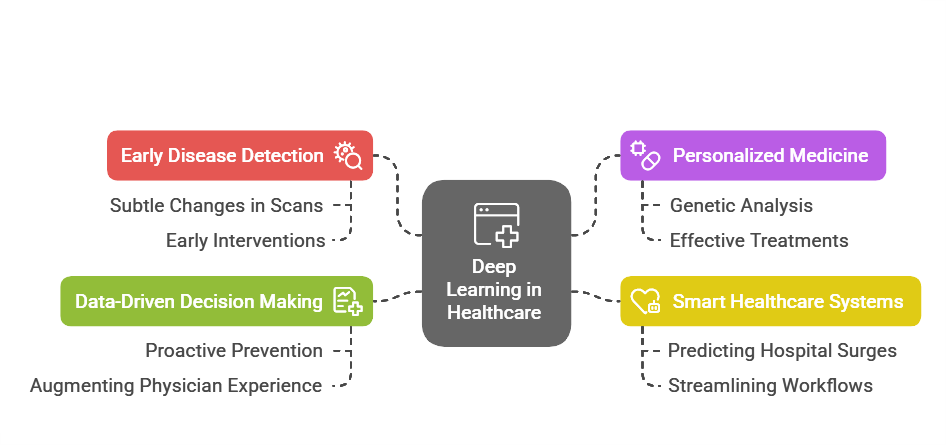
This isn't about robots replacing doctors; it's about giving them superpowers. You don’t need to be a coder to get this. Deep learning in healthcare is about:
- Seeing the Invisible: Imagine doctors with X-ray vision, but for everything. Deep learning can detect subtle changes in scans — changes that a human might miss — allowing for earlier detection of diseases, when they’re more treatable. We’re talking about flipping the script from late-stage diagnoses to early interventions.
Consider a radiologist I spoke to, who, after years of training, still acknowledges that they sometimes miss subtle signs on scans — signs that AI can now highlight with unwavering precision. That’s not just tech; it’s a safety net for both doctor and patient.
- Cracking the Code of Life: Our genes are a complex mess of information. Deep learning is like a super-powered decoder ring, finally making sense of our DNA. It can predict who is at risk and which treatments will be most effective for you, not just the average patient. It’s personalized medicine, finally realized.
I remember talking to a cancer survivor who went through round after round of chemo, each with brutal side effects, before finding the one that worked. Personalized medicine, powered by deep learning, promises to end that agonizing trial-and-error. It’s about treatment designed for you from day one.
- Making Healthcare Actually Smart: Right now, healthcare often feels… dumb. Systems don’t communicate with each other, errors occur and resources are wasted. Deep learning can make the whole operation intelligent — predicting hospital surges, streamlining workflows and freeing up doctors and nurses to do what they do best: care for people, not paperwork.
Ask any nurse about their day, and half of it is likely spent wrestling with clunky systems and chasing down information rather than caring for patients. Deep learning can automate administrative chaos, giving clinicians back their time — and their sanity.
- Moving Beyond Guesswork: For too long, medicine has been part art, part guess. Deep learning brings data-driven precision. It’s about moving from gut feelings to hard evidence, from reactive treatments to proactive prevention. It's about finally building a healthcare system that’s as smart as the people who dedicate their lives to it.
I remember a conversation with a seasoned physician who, with a touch of humility, admitted that even with decades of experience, diagnosis sometimes feels like educated guesswork. Deep learning isn't about replacing that experience but augmenting it with a level of data analysis that surpasses human capability.
Related Article: 5 Levels of AI in Healthcare: From Chatbots to Scaled Innovation
Deep Learning in Action: Real Healthcare Stories, Real Impact
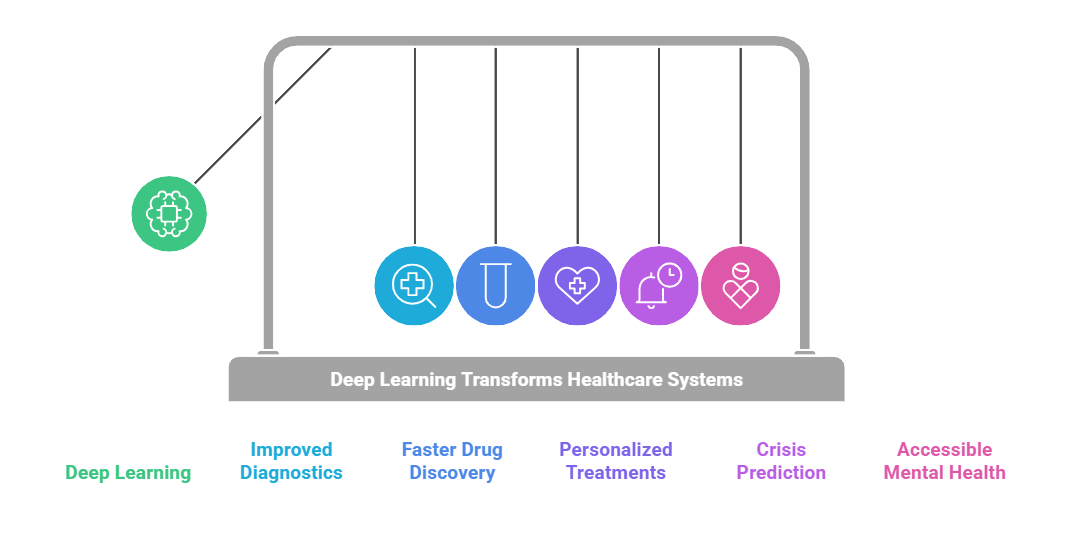
Forget hypotheticals — deep learning is already saving lives and changing the game right now. This isn't science fiction. This is happening today:
- Eyes That Never Tire: Google’s DeepMind AI has been detecting eye diseases more accurately and efficiently than many specialists since 2018. Think about that: machines extending expert care to everyone, everywhere. That’s not just efficiency; that’s equity.
I’ve seen the data — deep learning systems detecting early signs of diabetic retinopathy (a diabetes-related eye condition that damages the blood vessels in the retina) in rural clinics, places where specialists are hours away. It's not just about better care; it’s about accessible care for those who need it most.
- Drugs Discovered in Digital Labs: Companies are using deep learning, such as Google’s DeepMind AlphaFold, to find new drugs fast. It’s like shrinking years of lab work down to months, maybe even weeks or days. Imagine the diseases we can conquer when discovery isn't held back by slow, old methods.
Think about the researchers racing against time to develop treatments for emerging pandemics. Deep learning isn't just speeding up drug discovery; it's accelerating our response to global health crises, potentially saving millions of lives.
- Cancer Care Tailored to You: IBM Watson (yes, it's still around!) is helping doctors personalize cancer treatments. It's like having a super-expert on every case, making sure patients receive the right treatment right away.
I read a case study about a woman with a rare form of leukemia, where Watson Oncology helped doctors identify a treatment pathway they might have otherwise missed. That's not just information; that's hope delivered through intelligent technology.
- Hospitals That Predict Crises: Hospitals such as Mount Sinai are using AI to predict when patients are about to get worse. Think of it as a warning system for the human body, giving doctors time to act before it’s too late. That’s not just technology; that’s compassion built into the system.
I spoke with a hospital administrator who described how their AI-powered early warning system reduced ICU admissions by a significant percentage. That's not just about cost savings; it's about fewer patients suffering from preventable complications.
- Mental Health in Your Pocket: AI chatbots provide 24/7 mental health support. It's not a replacement for human connection, but it’s a lifeline for millions who can’t access or afford traditional care. That’s access, democratized.
Consider the teenager in a remote community struggling with anxiety who finds solace and support in an AI-powered chatbot because there are no therapists nearby. It's not perfect, but it's a start — a digital hand reaching out when no human hand is available.
The Roadblocks — and How to Bulldoze Them
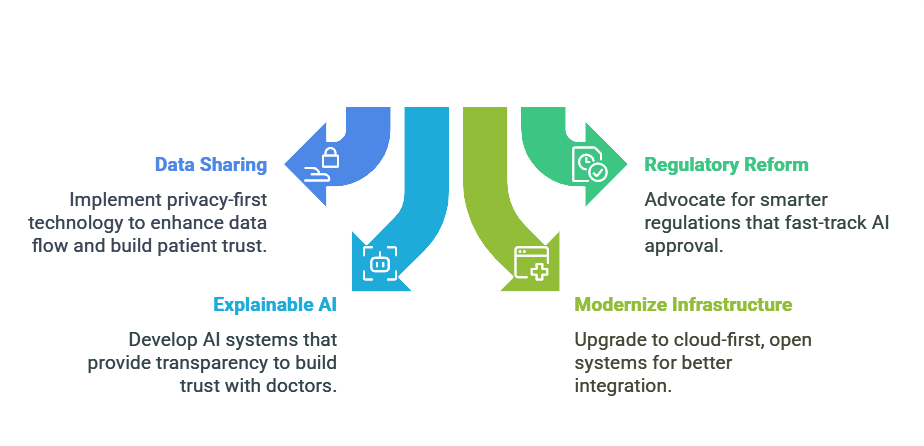
Revolutionary tech, yes, but the path isn't paved with roses — we need to level the obstacles in our way. Let’s not pretend it’s all sunshine and roses. Healthcare’s got hurdles for deep learning:
- Data Fortress, Not Data Flow: Patient data is locked up tighter than Fort Knox, for good reason. But we need to share data safely to train these intelligent machines.
Solution: Smart data sharing — privacy-first tech, ironclad security, patient trust built in.
I've heard countless debates about data sharing in healthcare and the tension between innovation and privacy. It's a real dilemma, but we can't let fear paralyze progress. We need to find the bright path forward, not just the safest, slowest one.
- Red-Tape Jungle: Healthcare is drowning in regulations. Getting new tech approved is a nightmare.
Solution: Smarter regulations — fast-tracking for truly game-changing AI, not just more paperwork.
Talk to any health tech startup, and they'll tell you about the regulatory labyrinth. We need regulators to be partners in innovation, not just gatekeepers, creating pathways for safe and rapid adoption of beneficial AI.
- The "Black Box" Fear: Doctors won't trust machines they don't understand. “AI says so” isn’t good enough in medicine.
Solution: Explainable AI — machines that show their work so doctors can see the logic, not just the answer.
I remember a physician telling me, "I'm not going to blindly follow an algorithm if I don't know why it's telling me something." Trust in AI in healthcare isn't automatic; it has to be earned through transparency and explainability.
- Old Systems, New Tech: Hospitals often run on technology from the Stone Age. Trying to plug in cutting-edge AI? Good luck.
Solution: Modernize the infrastructure — cloud-first, open systems, tech that talks to each other.
I’ve seen hospitals spending fortunes on AI solutions only to find they can't integrate with their ancient EHR systems. It’s like putting a Ferrari engine in a horse-drawn carriage. We need to upgrade the whole system, not just add fancy gadgets.
Healthcare’s Deep Learning Future — Radical Possibilities
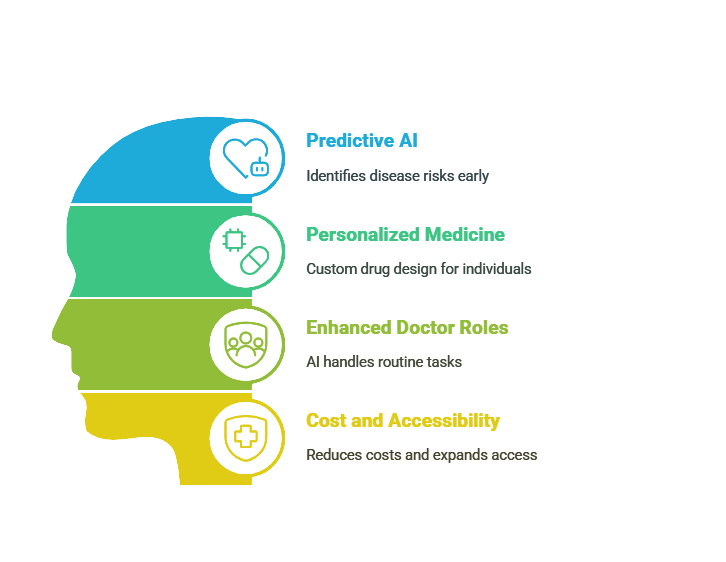
Fasten your seatbelts — the future of healthcare powered by deep learning is going to be breathtakingly different.
This is just the beginning. Imagine a future where:
- Diseases Are Caught Before They Start: Predictive AI identifies risks years in advance, enabling truly preventive care.
- Drugs Are Designed for You: Personalized medicine isn’t a luxury; it’s the standard.
- Doctors Are Superpowered, Not Replaced: AI handles the drudgery, freeing doctors to focus on the human side of healing.
- Healthcare Is Finally Affordable and Accessible: AI drives down costs and extends expert care to everyone, everywhere.
A Nightingale-Inspired Call to Action
I will draw on the insights of Florence Nightingale, the pioneer of modern nursing, who is known for her commitment to data-driven solutions and unwavering dedication to patient care. She might say:
“This is not the moment for complacency. We must embrace innovation, allow deep learning to lead us and create a future where healthcare flourishes — not fails.”
Healthcare is at a breaking point. We can keep patching up a broken system, or we can embrace a radical cure: deep learning. This isn’t just about better technology; it’s about a fundamentally better kind of healthcare — smarter, fairer and more human, as it turns out.
Healthcare leaders, are you going to tinker around the edges, or are you ready to lead a revolution? Share this, challenge the status quo and demand real change. The future of health isn't just digital; it's intelligent. The old ways are failing. It’s time for a change, and deep learning is the most powerful tool we’ve got.
Learn how you can join our contributor community.
